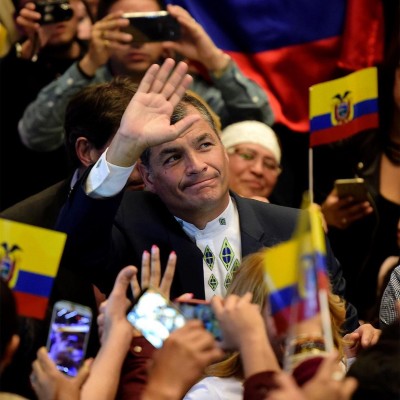Ecuador’s Progressive Candidate Lenin Moreno Defeats Banker in Presidential Election
The CNE said it was a transparent and successful election process, calling for everyone to respect the results.

Progressive candidate and renowned disability activist from the ruling Alianza Pais, Lenin Moreno has won the Ecuadorean presidential election Sunday.
With 98.45 percent of the official vote counted, Lenin defeated former banker Guillermo Lasso, candidate for the right-wing CREO-SUMO alliance with 51.14 percent to 48.86 percent, according to results issued by the country’s National Electoral Council on Monday morning.
In what many had already predicted, right-wing vice presidential candidate Andres Paez has called for a recount, even though the CNE said it was a transparent and successful election process, calling for everyone to respect the results.
Moreno is set to continue and expand social programs introduced under outgoing President Rafael Correa, for whom Lenin served as vice president from 2007 to 2013, before working as the U.N. special envoy for Disability and Accessibility.
Moreno who has been wheelchair bound after being shot and paralyzed in 1998, is well known for his advocacy work for people with disabilities and supporting public education. Jorge Glass, who also served in the Correa administration will now serve as vice president. The new administration will be officially inaugurated on May 24.
As Rafael Correa departs after 10 years of consecutive rule and a number of social gains made under the Citizens’ Revolution, the victory for Lenin is seen as key not only for Ecuador but for the wider Latin American region. Ecuador will remain a part of the pink tide that has swept the region in the past two decades, not following the right-wing shift that took place in 2016 in Argentina and Brazil.
After decades of social and economic instability including the frequent changing of presidents, Alianza Pais under Correa lifted more than a million people out of poverty, tripled tax income and expanded the country’s universal health care and education
Sunday’s election was the second round of voting after Moreno fell short by less than 0.7 percent on Feb. 19 to win in the first round.
Close to 12.5 million Ecuadoreans in the country, along with almost 400,000 emigrants around the world, were eligible to vote in Sunday’s election. Polling stations were set up in Miami, New York, London and Madrid.
Moreno voted in the north of Quito, accompanied by hundreds of his supporters. Lasso voted with his family in his hometown in the port city of Guayaquil. Correa also voted in the capital along with other government ministers.
“It’s a decisive moment for the region because of the extreme right-wing’s reaction in the last years. Ecuadorean elections are very important,” said Correa while voting.
Moreno’s supporters who gathered from the early afternoon celebrated in the central north of Quito, outside the headquarters of Alianza Pais.
The election was overseen by international observers including former Uruguayan President Jose “Pepe” Mujica, working with the UNASUR electoral mission. Mujica confirmed that the voting had been transparent.
Despite the CNE and international observers announcing that there were no issues with voting, similar to the first round of voting in February, rumors of voting fraud were circulated on social media by the opposition.
Defeated CREO vice presidential candidate, Andres Paez had threatened earlier to protest outside of the CNE offices over fraud claims, urging his followers to come out into the streets.

